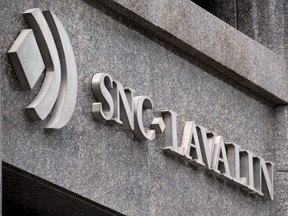Only a criminal trial will reveal whether SNC-Lavalin’s corruption infected the government, too
Opinion: It would also expose who in government might have been involved

Article content
Trials are designed to detail wrongdoing by government and corporate officials alike and to mete out justice in a transparent forum that the public can understand. Deferred prosecution agreements (DPAs) are designed to cover up details of wrongdoing and replace jail time for corrupt government and corporate officials with fines for corporations.
Montreal engineering giant SNC-Lavalin, facing charges of corruption and fraud under Canadian law related to its Libyan operations, understandably wants to avoid trials now and in future. The company claims that past misdeeds can be entirely laid at the feet of a few so-called “bad apples” who have since been removed. If SNC-Lavalin were nevertheless found guilty through an exhaustive examination of witnesses and the presentation of evidence, that claim could be eviscerated — the “bad apples” in question have already said they were carrying out widely employed company practices. If so, the company not only stands to lose federal government contracts over the next 10 years, its officers stand to be incarcerated.
But a trial here or elsewhere would not only expose who knew what and when within the firm; it would also expose who in government might have been involved.
The 2002 conviction of Toronto-based engineering firm Acres International regarding a $12-billion water project in the African country of Lesotho is a case in point. The trial revealed that one of the masterminds of the bribe scheme was none other than Canada’s honorary consul in Lesotho, a cabinet appointee of the Chrétien government. It also revealed our federal government was willing to go to great lengths to defend Acres’ financial interests by enlisting the efforts of the Canadian International Development Agency, the Department of Foreign Affairs and International Trade and the Canadian Embassy in Washington. The federal government’s support for Acres continued even after its conviction. Its efforts included disparagement by Export Development Canada of the court’s decision and a federal government attempt to prevent the World Bank from debarring Acres from World Bank-funded contracts.
If the government played any role as an accomplice, a promoter, or a wilfully blind contributor to SNC-Lavalin’s corruption, that would be exposed in a trial. Even if government wasn’t criminally culpable, favoured companies like SNC-Lavalin often feel that they are above the law because they have friends in high places.
DPAs rather than provide the transparency to the public of a trial, reinforce such cronyism. As seen so spectacularly in the current SNC-Lavalin scandal, the introduction of DPAs (or “remediation agreements” as they’re technically called in Canada) politicize the administration of justice and undermine public trust in government. Moreover, the claims made for DPAs — that they act to deter corruption — have proven to be false. Recidivism is high, as seen among the many firms that have had multiple DPAs. “We have companies that have received deferred prosecution and non-prosecution agreements multiple times in a short span of time,” states Brandon Garrett, a Duke law professor and author of Too Big to Jail: How Prosecutors Compromise with Corporations. “It seems like the agreements aren’t working and serious problems still remain at some companies.” If a firm merely has to pay a fine when it gets caught making a bribe, and if corporate executives don’t need to fear personal humiliation and jail time, DPAs become just another cost of doing business.
The goal of anti-corruption enforcement must be deterrence. Apart from forcing a corrupt company to disgorge any ill-gotten gains, jail time and loss of assets for the individuals who carried out the corruption are the most effective deterrent.
The SNC-Lavalin case begs for an airing. With accusations of SNC-Lavalin corruption extending to nine countries, including Canada, there is good reason to believe that the practice was systemic, and that the rot may extend to government officials and government departments.
DPAs don’t cut it. The director of public prosecutions, Kathleen Roussel, thinks SNC-Lavalin should go to trial. Jody Wilson-Raybould, the former Attorney General so strongly supported that decision that she was willing to put her job on the line rather than succumb to high pressure from high federal officials. According to a Nanos poll out this week, most Canadians — 55 per cent — agree with our prosecutorial authorities’ decision.
The new attorney general, David Lametti, should likewise resist federal pressure to negotiate a DPA. The Canadian public will not be confident of justice in the SNC-Lavalin case if the truth is not allowed to come out in court.
Patricia Adams is an economist and the executive director of Toronto-based Probe International. Patricia.Adams@Probeinternational.org









Postmedia is committed to maintaining a lively but civil forum for discussion. Please keep comments relevant and respectful. Comments may take up to an hour to appear on the site. You will receive an email if there is a reply to your comment, an update to a thread you follow or if a user you follow comments. Visit our Community Guidelines for more information.